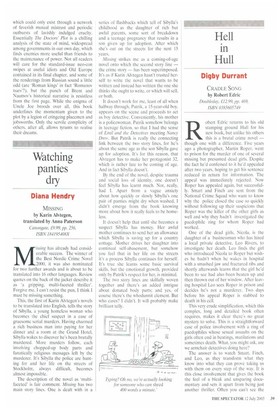Watching panties dry
Diana Hendry
MISSING by Karin Alvtegen, translated by Anna Paterson Canongate, £9.99, pp. 256, ISBN 184195408X missing has already had considerable success. The winner of the Best Nordic Crime Novel 2000, it was also nominated for two further awards and is about to be translated into 16 other languages. Review quotes on the back of the jacket describe it as 'a gripping, multi-faceted thriller'. Forgive me, I can't resist the pun, I think I must be missing something.
This, the first of Karin Alvtegen's novels to be translated into English, tells the story of Sibylla, a young homeless woman who becomes the chief suspect in a ease of gruesome serial murders. Having charmed a rich business man into paying for her dinner and a room at the Grand Hotel, Sibylla wakes to discover he's been brutally murdered. More murders follow, each involving chopped-up body parts and fanatically religious messages left by the murderer. It's Sibylla the police are hunting for and her life on the streets of Stockholm, always difficult, becomes almost impossible.
The description of the novel as 'multifaceted' is fair comment. Missing has two main story lines, One is dealt with in a series of flashbacks which tell of Sibylla's childhood as the daughter of rich but awful parents, some sort of breakdown and a teenage pregnancy that results in a son given up for adoption. After which she's out on the streets for the next 15 years.
Missing strikes me as a coming-of-age novel onto which the second story line — the crime story — has been superimposed. It's as if Karin Alvtegen hasn't trusted herself to write the novel that wants to be written and instead has written the one she thinks she ought to write, or which will sell, or both.
It doesn't work for me, least of all when halfway through, Patrik, a 15-year-old boy, appears on the scene and proceeds to act as boy detective. Conveniently, his mother is a policewoman. Patrik somehow belongs in teenage fiction, so that I had the sense of Emil and the Detectives meeting Nancy Drew. But Patrik is really the connecting link between the two story lines, for he's about the same age as the son Sibylla gave up for adoption. It's for this reason, that Alvtegen has to make her protagonist 32, which is rather late to be coming of age. And in fact Sibylla doesn't.
By the end of the novel, despite trauma and social loss of identity, one doesn't feel Sibylla has learnt much. Nor, really, had I. Apart from a vague anxiety about how quickly or slowly Sibylla's one pair of panties might dry when washed, I didn't emerge from the book knowing more about how it really feels to be homeless.
It doesn't help that until she becomes a suspect Sibylla has money. Her awful mother continues to send her an allowance which Sibylla is saving up for a country cottage. Mother drives her daughter into continual self-abasement, but somehow you feel that in her life on the streets it's a process Sibylla continues for herself. It's true she learns some basic survival skills, but the emotional growth, provided only by Patrik's respect for her, is minimal.
• The two story lines are skilfully woven together and there's an added intrigue about donated body parts; and yes, of course there's the whodunnit element. But who cares? I didn't. It will probably make brilliant telly.


































































 Previous page
Previous page